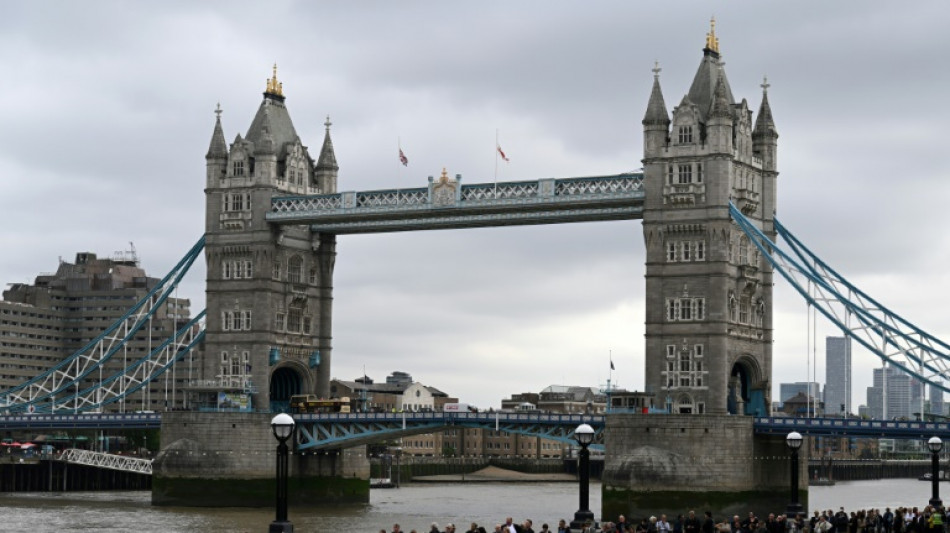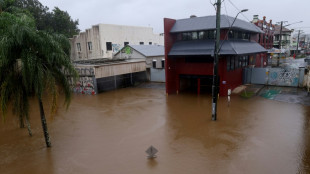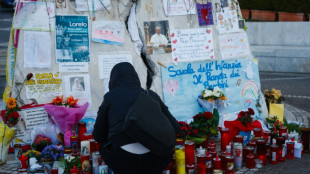
-
 Stock markets slump on US recession fears
Stock markets slump on US recession fears
-
'Elbows up!' - the hockey tactic inspiring Canada's anti-Trump fight

-
 Argentina searches for baby, young sister swept away by floods
Argentina searches for baby, young sister swept away by floods
-
Stock markets slump on US economic fears

-
 UN chief says 'poison of patriarchy' is back with a vengeance
UN chief says 'poison of patriarchy' is back with a vengeance
-
UBS fined 75,000 euros in France for harassing two whistleblowers

-
 Stock markets slump on US, China economic fears
Stock markets slump on US, China economic fears
-
Major fuel shortage hits black gold producer Niger

-
 Musk spat renews opposition in Italy to Starlink deal
Musk spat renews opposition in Italy to Starlink deal
-
Stock markets mainly lower on China, US economy fears

-
 Former Ubisoft bosses on trial in France over alleged harassment
Former Ubisoft bosses on trial in France over alleged harassment
-
Strike action grounds thousands of flights in Germany

-
 Trump says US in talks with four groups over TikTok sale
Trump says US in talks with four groups over TikTok sale
-
Hong Kong, Shanghai lead losers on mixed day for markets

-
 'Got cash?' Tunisians grapple with new restrictions on cheques
'Got cash?' Tunisians grapple with new restrictions on cheques
-
Russian disinformation 'infects' AI chatbots, researchers warn

-
 'Quite sad': Renters turn to lottery in Spain's housing crisis
'Quite sad': Renters turn to lottery in Spain's housing crisis
-
Indonesians seek escape as anger rises over quality of life

-
 Iran says won't negotiate under 'intimidation' as Trump ramps up pressure
Iran says won't negotiate under 'intimidation' as Trump ramps up pressure
-
7-Eleven, Couche-Tard explore sell-offs ahead of potential merger

-
 Trump admin detains pro-Palestinian campus protest leader
Trump admin detains pro-Palestinian campus protest leader
-
Japan auctions emergency rice reserves as prices soar

-
 Hong Kong, Shanghai lead losers on mixed day for Asian markets
Hong Kong, Shanghai lead losers on mixed day for Asian markets
-
China-US trade war heats up as Beijing's tariffs take effect

-
 7-Eleven to explore sell-offs with Couche-Tard ahead of potential merger
7-Eleven to explore sell-offs with Couche-Tard ahead of potential merger
-
Shareholders of Regeneron Pharmaceuticals, Inc. Should Contact Levi & Korsinsky Before March 10, 2025 to Discuss Your Rights - REGN

-
 'So important': Selma marks 60 years since US civil rights march
'So important': Selma marks 60 years since US civil rights march
-
Black comedy from award-winning 'Parasite' director tops N.America box office

-
 EU chief sees US as 'allies' despite 'differences'
EU chief sees US as 'allies' despite 'differences'
-
French research groups urged to welcome scientists fleeing US

-
 Journalist quits broadcaster after comparing French actions in Algeria to Nazi massacre
Journalist quits broadcaster after comparing French actions in Algeria to Nazi massacre
-
Highlights from Paris Women's Fashion Week

-
 US ends waiver for Iraq to buy Iranian electricity
US ends waiver for Iraq to buy Iranian electricity
-
China-US trade war heats up with Beijing's tariffs to take effect

-
 Greenland's Inuits rediscover their national pride
Greenland's Inuits rediscover their national pride
-
Floods, mass power cuts as wild weather bashes eastern Australia

-
 Wild weather leaves mass blackouts in Australia
Wild weather leaves mass blackouts in Australia
-
China consumption slump deepens as February prices drop

-
 Phone bans sweep US schools despite skepticism
Phone bans sweep US schools despite skepticism
-
Some 200 detained after Istanbul Women's Day march: organisers

-
 'Grieving': US federal workers thrown into uncertain job market
'Grieving': US federal workers thrown into uncertain job market
-
Remains of murdered Indigenous woman found at Canada landfill

-
 Women will overthrow Iran's Islamic republic: Nobel laureate
Women will overthrow Iran's Islamic republic: Nobel laureate
-
Women step into the ring at west African wrestling tournament

-
 Trump's tariff rollback brings limited respite as new levies loom
Trump's tariff rollback brings limited respite as new levies loom
-
Hackman died of natural causes, a week after wife: medical examiner

-
 Oops, we tipped it again: Mission over for sideways US lander
Oops, we tipped it again: Mission over for sideways US lander
-
Cyclone Alfred downgraded to tropical low as it nears Australia

-
 Global stocks mixed as Trump shifts on tariffs weighs on sentiment
Global stocks mixed as Trump shifts on tariffs weighs on sentiment
-
Trump says dairy, lumber tariffs on Canada may come soon

| RBGPF | 5.38% | 70.21 | $ | |
| RYCEF | -9.1% | 9.45 | $ | |
| CMSC | -0.3% | 23.042 | $ | |
| CMSD | -0.3% | 23.26 | $ | |
| NGG | 2.39% | 62.32 | $ | |
| SCS | -0.6% | 11.66 | $ | |
| RELX | -1.31% | 47.48 | $ | |
| RIO | -0.07% | 62.265 | $ | |
| AZN | -1.49% | 76.36 | $ | |
| VOD | 1.1% | 9.525 | $ | |
| JRI | 1.89% | 12.995 | $ | |
| GSK | 1.63% | 40.713 | $ | |
| BTI | -0.37% | 40.75 | $ | |
| BCE | 1.84% | 25.265 | $ | |
| BCC | -0.86% | 100.75 | $ | |
| BP | 0.59% | 32.26 | $ |

Britain draws pride from 'The Queue' for its queen
Orderly and good-natured, the enormous waiting line to see Queen Elizabeth II's coffin is being hailed as a triumph of Britishness in a country that prides itself on its queuing finesse.
"We British, this is what we do, queue in the rain," Jacob Lovewell, a 29-year-old who works in marketing, told AFP as he waited patiently in the slow-moving file as it snaked alongside the river Thames.
The line, which started forming more than 48 hours before people were first admitted on Wednesday evening, has its own YouTube channel and livestream.
Plastered over newspaper front pages and reported live on television, the length and pace of "The Queue" as it is increasingly known is the new focus of a country in the middle of 10 days of mourning and pageantry.
By early afternoon Thursday, it was more than four miles long (7.0 kilometres) -- and growing -- with people facing a wait of more than seven hours to glimpse the coffin, which is on display in Westminster Hall until Monday.
"It's brilliant," said Lisa Doodson as she crossed Lambeth Bridge early Thursday, with the spires of Westminster finally in sight. "Everyone's happy... Everyone is so helpful."
Strict rules mean no photography and no loitering in front of the casket, leaving well-wishers with only a few seconds to pay their respects after their trial of endurance to get there.
But those waiting are in good spirits, sharing snacks and chatting to their neighbours in an event of self-sacrifice and quiet socialising.
"If you're British, this is the queue you've been training for all your life. The final boss of queues," one Twitter user, @JofArnold, wrote.
"I don't particularly care either way about the Queen. But the queue? The Queue is a triumph of Britishness," added @curiousiguana.
- War legacy -
Queues and the ability to queue have long formed a curious part of Britain's self-identity, along with often idealised commitments to notions of "fair play" and politeness.
Rather than a sign of bad management, the hours-long wait to enter the annual Wimbledon tennis tournament is seen as part of the experience, while the tailbacks for the famed Glastonbury music festival are also part of its folklore.
A best-selling book on Britishness first published in 1946 called "How to be an Alien" by George Mikes -- a Hungarian-born immigrant -- claimed queuing was a "national passion of an otherwise dispassionate race".
"An Englishman, even if he is alone, starts an orderly queue of one," Mikes wrote.
Social historian Kate Bradley at the University of Kent told AFP that queuing became wrapped up in national mythology during World War II, when rationing was introduced, and people faced long waits for every-day items like bread and butter.
"Obviously there were queues before the Second World War, but tolerating the distress became a virtue during the war," she said.
Joe Moran, a historian at Liverpool John Moores University, told AFP the celebration of queues "sends back this self-flattering idea of the English as well-mannered".
The author of "Queuing for Beginners: The Story of Daily Life From Breakfast to Bedtime" noted how it also appealed as "very fair way of rationing a scarce resource".
- 'Making friends' -
Bradley and Moran both stressed that in modern Britain most daily queues were as frustrating as anywhere else in the world and that it was wrong to imagine orderly lines were exclusively British, or even a reality across the country.
During war-time rationing, the police were sometimes needed to put down riots and arguments were common, Moran said.
"Personally, I can't cope with a queue of more than five minutes," said Bradley, who is currently working on the history of telephone hotlines.
"Other countries queue, but it has become a sort of shorthand about talking about Britain and it conveniently fits with ideas about British people being emotionally distant, uptight, and holding back."
Both experts underlined how technology being used for the queen's admirers had also helped reduce one of the scourges of waiting in line: the widely despised queue-jumper.
Everyone is given an electronic bracelet which shows their position.
It also allows them to leave to go to one of the 500 temporary toilets or buy food and drink -- before returning to their spot.
M.P.Jacobs--CPN



